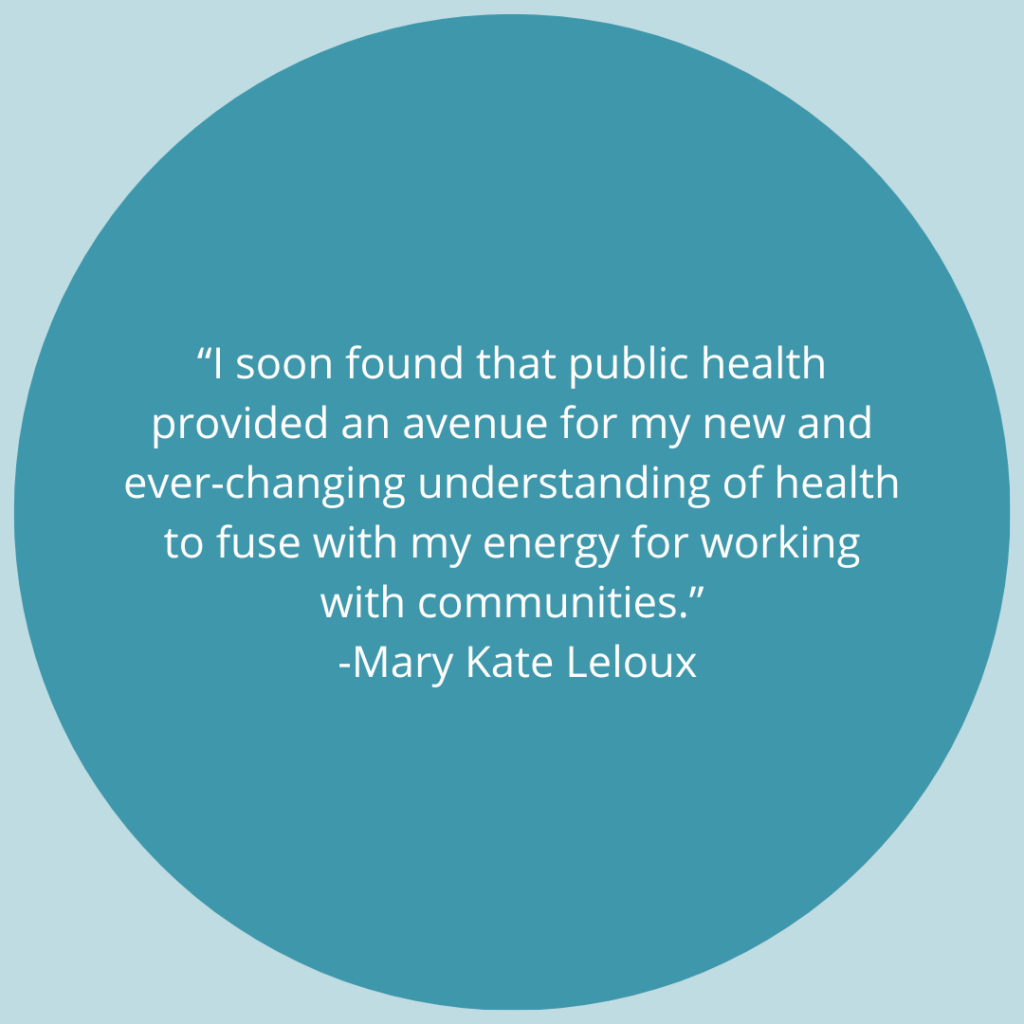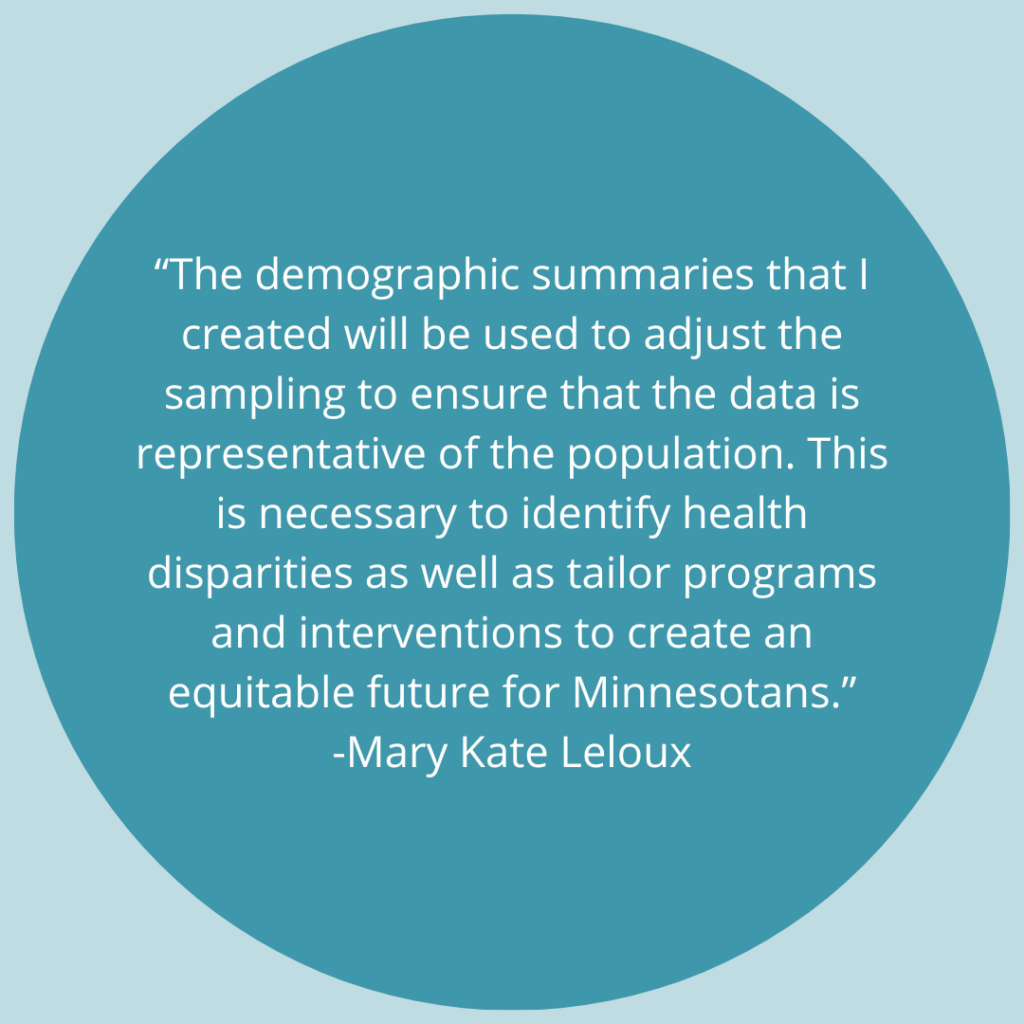#UMNMCH student Mary Kate Leloux (she/her) (MPH 2024) wrote this reflection on how her deployment with the Minnesota Department of Health PRAMS Project and passion for communities has developed her interest in representative public health data.
Path to the UMN MPH in MCH Program
With undergraduate studies in biology and sociology, I was often asked many questions from my rural community about where these studies would lead my career. Studying biology without the intent of applying for medical, physical therapy, or nursing school stirred up many questions from family members, friends, and colleagues. During my undergraduate experience, I enjoyed providing both hospital and in-home care for a rural population in the role of a Certified Nursing Assistant. I discovered my passion for public health while studying global health in Uganda during my sophomore year of college. Learning about health injustice through the context of Uganda was a powerful experience that completely changed the limiting view I had of health. I soon found that public health provided an avenue for my new and ever-changing understanding of health to fuse with my energy for working with communities. I was drawn to the MCH program at UMN because of their collective values of health equity and social justice, along with the incredible opportunities and support for students I saw surfacing through the Center for Leadership Education in Maternal & Child Public Health.
PRAMS: A Story of Data to Action
I completed a year-long deployment with the Pregnancy Risk Assessment Monitoring Systems (PRAMS) program at the Minnesota Department of Health (MDH). Minnesota PRAMS conducts a population-based survey that is led by the Centers for Disease Control & Prevention (CDC). Minnesota is one of fifty jurisdictions that participate in the CDC’s PRAMS surveillance project to gather data on maternal experiences before, during, and after pregnancy. The goal of this project since its launch by the CDC in 1987 was to reduce infant mortality and the incidence of low birth weight. Although this remains a part of PRAMS efforts, its goals extend to other maternal and child health indicators, such as breastfeeding and unintended pregnancy. PRAMS also provides surveillance tracking for national objectives including Healthy People 2030. Additionally, PRAMS data is put into action to inform programmatic efforts, policy and legislation, and the Title V MCH Block Grant.
Engaging Equity in Data
My role working for the Minnesota PRAMS project primarily focused on data collection and data entry. I learned about the importance of good data collection as a solid foundation for public health research, programs, and policy. Timeliness, accuracy, and completeness are important for data collection, and become more challenging as sample size increases. Being in a behind-the-scenes position at the state level of public health gave me an appreciation for good data on health indicators for all populations available to both researchers and the public. PRAMS data has been referenced in many of my MCH courses, where I am able to draw on my personal experience with the team to provide an inside perspective on the strengths and limitations of the data.
During my time with PRAMS, the team was preparing for a new phase of the survey (Phase 9). I participated in a review of materials including User Acceptance Testing (UAT) of the new survey in collaboration with the CDC and other jurisdictions. UAT is one of the first ways that a new survey is tested for any errors including skip patterns, spelling, answer options, and online platforms. This work allowed me to see one of the many complex steps preceding data collection with a new data collection tool and helped me understand research as a constantly evolving process.
Some of my work also focused on creating data summaries from completion reports to identify which groups are being represented by PRAMS data and how PRAMS outreach may need to expand to capture health indicators for all populations. I created summaries of demographics such as race, age, and rurality to understand who in the sampled population answered the PRAMS survey. The demographic summaries that I created will be used to adjust the sampling to ensure that the data is representative of the population. This is necessary to identify health disparities as well as tailor programs and interventions to create an equitable future for Minnesotans.
Now that my time with the Minnesota PRAMS team has come to a close, I am currently working for an NIH-funded research study at the University of Minnesota called Atherosclerosis Risk in Communities (ARIC). In this position, I am continuing to develop my hands-on research skills by working directly with the study’s research participants to coordinate recruitment, facilitate interviews, and support the performance of heart scans that provide 3D images to screen for an important indicator protein that may contribute to heart disease. I am thankful for my new skill set in data collection, data entry, and preliminary analysis that I now take with me into my current scholarship.
BIO
Mary Kate Leloux is a second year MCH MPH student. Her background is in global health and assistive nursing care. Mary Kate received her BS in Biology: Public Health from Dordt University in Sioux Center, Iowa. She recently completed her Applied Practice Experience (APEX) at The Mango Project, a nutrition education and distribution center in Northern Uganda, where she applied her coursework in an immersive global public health context. In her spare time, she enjoys being active outside and learning from the stories of others. After graduating, Mary Kate hopes to work directly with communities in the pursuit of social justice and healthier populations.
–Read Student Spotlight archives
Interested in learning more about getting a degree in MCH? Visit our MCH Program page for more information.
#UMNMCH #UMNproud #UMNdriven


